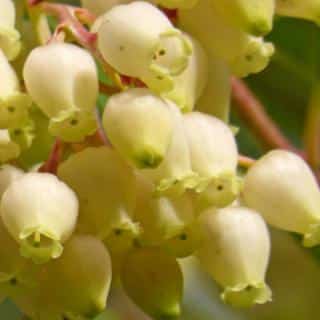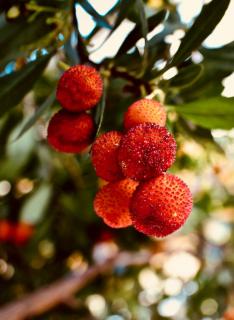

The strawberry tree is a remarkable shrub thanks to its fruits and cute berries that are shaped like strawberries.
Name – Arbutus unedo
Family – Ericaceae
Type – shrub
Height – 6 ½ to 16 feet (2 to 5 meters)
Exposure – full sun, part sun
Soil – ordinary
Foliage – evergreen
Flowering – August to November
Harvest – August to November
Planting, pruning and caring for your strawberry tree will ensure the proper development of your shrub.

For hedges, space the trees at least 32 inches (80 cm) apart.
Very easy to care for, the strawberry tree grows quickly when properly settled in and requires almost no care.
Spring is when strawberry trees are pruned.
Avoid pruning in fall, because you would be pruning off the magnificent berries that form and stay on the tree over winter.
Strawberry trees are shrubs that don’t require much water, except for specimens grown in pots.
The berries are ready for harvest when very mature, which is to say very red and slightly giving to the touch.
Typical uses are strawberry tree fruit jam, candied fruits, as well as syrup and liquor. When eaten raw, strawberry tree berries don’t really have a significant taste.

Its scientific name Arbutus unedo, means “one-time shrub” in latin.
Easy to care for, it adapts to all soil types, either in beds or in hedges, or in pots or garden boxes for a terrace.
You may plant it as a standalone and also as part of a hedge to decorate your hedge in winter thanks to its ornamental berries.
The strawberry tree is also a tree that boasts beautiful bark that comes of in long, vertical slabs of different colors.
Perfect to decorate a winter garden!
Read also on shrubs:
No need to add any fertilizer, but it is a good idea to mulch the base of the tree to avoid weed growth in summer and protect roots when winters are cold.
Ok my issue is the germination process , they don’t seem to grow in just soil processing. How do I germinate the seeds
Hi. I have three of these beautiful shrubs in front of my home currently bearing lots of fruit and blooms. Two of my neighbors have recently had a problem with gutter rats. Could these shrubs be providing food and hence an attraction for rats to this area? Thank you!
I am in the process of moving my 6 year old strawberry tree from the front yard and transplanting in the back what is the recomended season now or fall I’m in zone 9b. Central Ca.
Hi Richard, for trees, end of fall is the best choice. The tree goes dormant so it won’t suffer much stress from having lost roots/limbs, and still it’s in its new place during winter so it can replace lost roots before spring comes around.
July 17, 2022 I’m looking to take over a neighbor’s strawberry tree, currently its about 7’ H & 7’ W, but the truck does have any similar red branches or trunk? It this really a strawberry tree?
Hi Tony, the size might be approximately correct, but it’s really hard for me to tell you whether it’s a strawberry tree or not from your description. I emailed you so you could try and send me pictures.
I had 3 strawberry trees planted in May this year. Most of the leaves are turning brown but the branches are still flexible.
Does anyone know what causes this and Should I trim them now or will new growth make the brown leaves fall?
Hi Debbie, it may be that it’s simply the tree’s way to enter into the autumn and winter seasons. Fall and winter is when the tree sheds most of its leaves, some of them will stay on the tree (it is an evergreen, after all), but it does lose quite a lot of leaves during the dormant season. If you live in places where winter is harsh, it may even be that all the leaves will fall – but the tree won’t die unless it gets really cold.
Trimming the tree now isn’t necessary, it’s better to wait until spring if you want to remove some branches. If you mean removing the brown leaves, you don’t need to do it yourself; they’ll fall off naturally. Brown leaves isn’t related to any disease, it’s usually when there’s other colors like black spot that you should worry. In any case, new growth should come back by spring next year.
Hello my neighbour has cut the branches of my strawberry tree that over hang his property although I asked him to wait until late winter or early spring. Will the tree suffer from this treatment? It does look lopsided now.
Hi Lesley, though it wasn’t the best of timing, the tree will surely survive. After all, branches break off naturally in all seasons due to foul weather, and a clean cut is always much healthier than twisted, broken branches. It will recover very well, in time. For the lopsidedness, sometimes it helps to observe the tree for a moment to see if cutting another branch on the opposite side would make it look better. Close one eye and try blotting the one or the other branch out with a finger or hand to see if it restores balance, or if you like drawing, sketch it out. In time, of course, the tree will just sprout new branches on both sides, so your goal should be to make the tree appealing to your neighbor as well. There are a few recipes I know of to make delicious jams and syrups – I can try to write them up for you if you wish!
Hi Lesley! Although I am a new strawberry tree owner and my tree won’t bear fruit for a year or so, I would be delighted to get your recipe for jams!
Hello Joanne! Great thing to prepare for! Here is the recipe for strawberry tree fruit jam. Hope you like it!
It is OK to plant 3 strawberry trees in a triangle shape 14′ from each other?
Hi Hector, yes, it’s possible. They won’t compete too much and in time will merge to form one large cluster. In the wild they grow even denser than that, even just a few feet apart and still they thrive. It depends on the overall appearance you’re hoping to reach. With a distance of only a few feet, they’ll grow fine but just not as tall. With 14 feet you won’t have any issues of the sort.